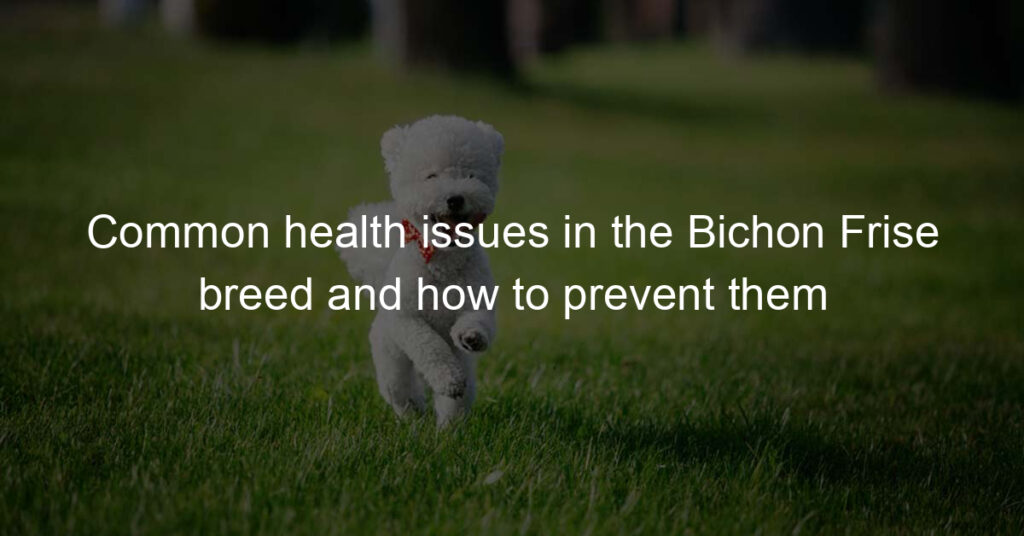The Bichon Frise is a popular dog breed known for its beautiful white coat and fun-loving personality. However, like all breeds, the Bichon Frise is susceptible to certain health problems.
In this blog post, we’ll take a look at some of the most common health issues in the Bichon Frise breed and how you can prevent them.
- Bichon Frise is prone to health issues such as allergies, ear infections, and respiratory problems
- The best way to prevent these health issues is by keeping your dog clean and healthy
- Brush your Bichon Frise’s fur regularly to remove any dirt or debris
- Check your dog’s ears for any signs of infection, and clean them regularly
- Take your Bichon Frise for regular checkups with the vet to catch any health problems early
What are the common health problems for a Bichon Frise?
The Bichon Frise is a charming, lovable breed of dog that is sadly prone to certain genetic health issues.
Common health problems for this breed include Sensory Ataxic Neuropathy (SAN), hearing loss, and progressive retinal atrophy – a degenerative eye disorder that leads to blindness.
While owners of these dogs need to be informed about their potential conditions, the good news is that advances in veterinary medicine have created treatments and management options that can help maintain a comfortable quality of life for them.
Regular visits with a veterinarian and a proper diet can go a long way towards reducing or eliminating some symptoms and maintaining your Bichon’s continued health.
What diseases do Bichons get?
Bichon Frise dogs are a popular breed with temperaments that often make them great family pets, but, as with any breed of dog, there are some health issues the Bichon can develop.
While they are generally classified as a healthy breed, Bichons are prone to conditions such as heart problems, cataracts, ear infections, skin allergies, and hip dysplasia. Bichons may also be at risk for luxating patella (floating kneecap), dental or gum issues, and seizures.
It’s important to provide your Bichon with proper nutrition and regular exercise to ensure optimal health; regular veterinary checkups should also help detect any potential problems early for proper diagnosis and treatment.
How do I keep my Bichon Frise healthy?
Keeping a Bichon Frise healthy requires regular exercise, proper nutrition, and regular trips to the veterinarian.
Exercise for this breed is important for their overall health, and an ideal activity will involve at least 30 minutes of slow-paced walking per day.
To keep your pet happy and in optimal health, it is recommended that you feed them high-quality dog food specifically made for small dogs.
Lastly, you should take your pup to the vet once every six months or whenever they’re not feeling well and need medical attention. By doing all of these things, you can ensure your Bichon Frise remains healthy throughout its lifetime.
What should Bichon Frise not eat?
A Bichon Frise is best known for its loyal and sociable personality, but it is important to remember that what they eat is critical too.
An unhealthy diet can increase their risk of illness and put them at greater risk of obesity. To ensure that they remain happy and healthy, owners should avoid feeding them food such as onions, garlic, chocolate, grapes, or raisins which can be extremely hazardous to the health of a Bichon Frise if ingested.
Furthermore, table scraps are not a good idea as they are often high in salt and calories. Owners should stick to a balanced diet plan designed specifically for this breed of dog so that the dog maintains good nutrition.
To Conclude
There you have it! Although Bichons can be a wonderful addition to the family, it’s important not to forget about their specific healthcare needs.
When considering adding a Bichon Frise to your family, be sure to make an appointment with your veterinarian so they can help you create an individualized health plan. This will ensure that your pup stays as healthy and happy as possible.
Remember that they may not give a lot of warning signs when something is wrong, so being proactive and aware of the common issues that affect Bichons is very important. With regular visits to the vet and proper routine care, you can increase the lifespan of your pet and enjoy their company for longer.








